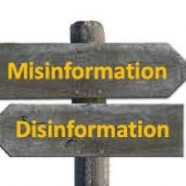
Our society has become so emotionally charged with mistrust and negativity, sowing doubts about our core democratic institutions (e.g. voting), fair treatment of minorities and even honest relationships among neighbors and friends. A primary driver for this hyper-polarization is the rampant spread of misinformation, which also endangers the heart of good branding. The most mind-boggling question is WHY so many consistently refuse to believe the truth, even when clear facts and convincing evidence are presented to them.
FDR once said: “repetition does not transform a lie into a truth”. However, there are countless falsehoods that people repeat today: Obama is a Muslim, vaccinations cause autism, the January 6 insurrection was a “normal tourist visit”, and especially the “Big Lie”, that our 2020 election was fraudulent and Trump really won. Preposterous misinformation like this affects decision making and undermines the core trust and integrity all our political system.
Many political scientists have identified growing social and psychological forces that have led to this stubborn resistance to accept the truth. In a recent paper in Proceedings of the National Academy of Science, a Dartmouth professor, Brendan Nyhan, reported that the ultimate culprits involve “cognitive and memory limitations”. He identified three main drivers that make people prone to misinformation and contribute to social polarization:
- Ingrouping – social scientists define this as a strong belief that one’s own social identity is a key source of strength and superiority. Basically it is a feeling of belonging to a community of shared opinions and values where people fear unwanted change as destabilizing. They perceive the world as a grand conflict between their righteous “ingroup” against the nefarious “outgroup”. They also seek information that affirms their sense of us versus them, even if not true or accurate. Another dimension of this inward thinking is “motivated reasoning”, where an individual accepts information, even untrue, to support their conclusions or beliefs. Basically these people believe what they want to believe.
- Visible Leaders – the emergence of high-profile political and media figures who tend to encourage their followers to accept misinformation to sustain their partisan identification. They create an atmosphere of intense political conflict where they believe they will benefit from rallying people behind them. For example, Congressman Louie Gohmert from Texas insisting there is no evidence that the insurrectionists were armed on January 6. This phenomenon is evident with so many Republicans (53%) who still claim the presidential election was stolen from Trump (versus 3% of Democrats, and 25% of all Americans – Gallup poll, May 2021) , although some politicians may state this opinion only to maintain their appeal to this “ingroup” base.
- Social Media – this is a powerful outlet for composers of disinformation. For passionate users of Facebook or Twitter, the “likes” of inflammatory and false statements become a rewarding source of gratification, and algorithms help multiply future sharing of posts. Fortunately there has been some corrective progress recently. A coalition of misinformation researchers found that about half of all retweets of false claims on election interference came from just 35 Twitter accounts, including Trump. In light of this, Facebook also just announced that it would apply stricter punishments to such “superspreaders” of misleading or untrue posts.
Many experts feel this epidemic of misleading and erroneous information will result in the de-legitimization of our democratic institutions and undermine resolution of serious worldwide problems – e.g. science deniers who believe climate change is a hoax. This misinformation pandemic and hyper-partisanship can be controlled only with more fact checking, more courageous leaders who will elevate the truth instead of succumbing to bias and falsehoods, and social media prohibiting blatant disinformation.



Connect with us